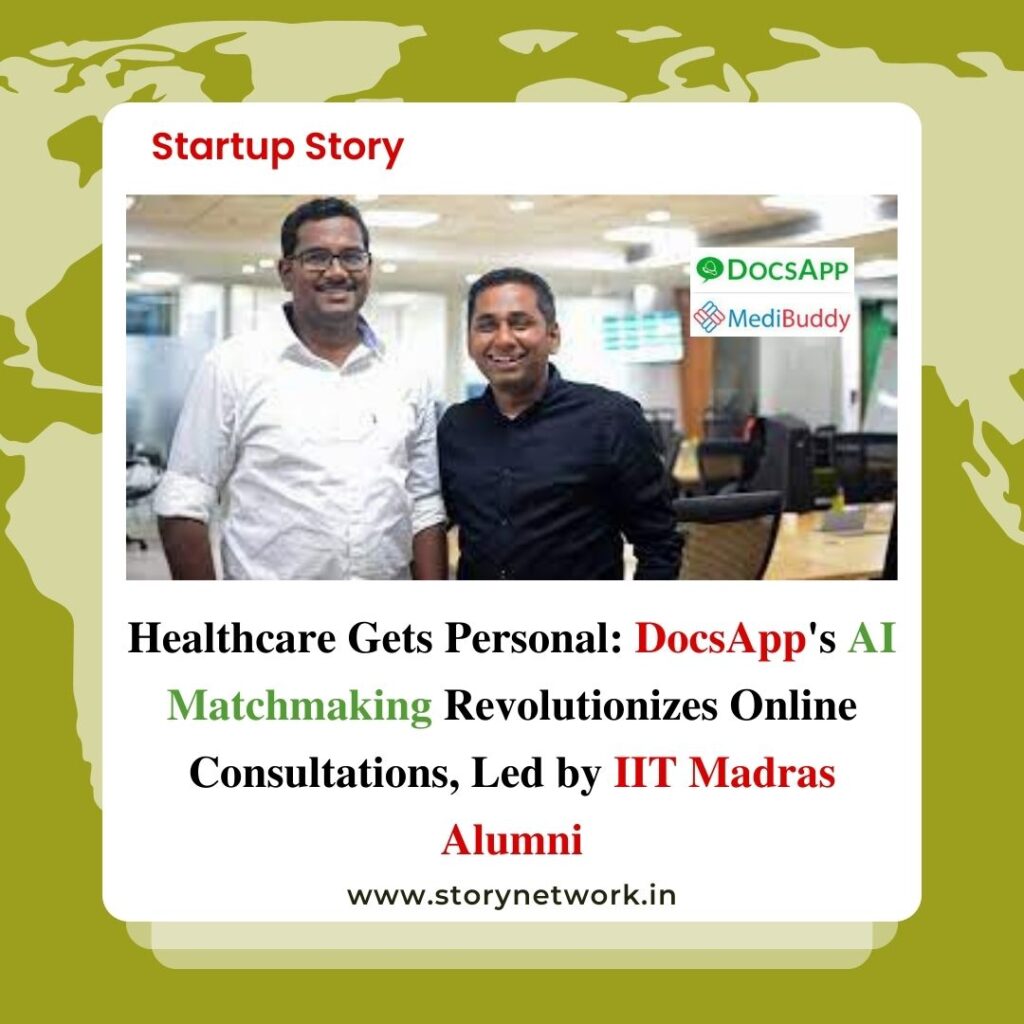Gone are the days of navigating endless online medical directories or waiting in doctor’s offices filled with uncertainty. Enter DocsApp, a startup redefining online consultations with a unique AI-powered approach that puts the “personal” back in healthcare.
By leveraging the power of artificial intelligence, DocsApp acts as a smart cupid, connecting patients with the right doctors based on their specific needs and preferences. This innovative model empowers both patients and doctors, paving the way for improved healthcare access and outcomes, especially in underserved areas.
Powered by innovation and a passion for accessible healthcare, DocsApp is reshaping the landscape of online medical consultations. This Bengaluru-based startup, conceived by IIT Madras alumni Satish Kannan and Enbasekar Dinadayalane in 2015, is leveraging the power of artificial intelligence to connect patients with the right doctors based on their specific needs and language preferences.
Kannan and Dinadayalane, two engineers driven by a desire to bridge the healthcare gap, recognized the limitations of traditional online patient-doctor matching. Their vision: create a platform that eliminates the guesswork and anxiety associated with finding the right medical professional, making quality healthcare accessible to all.
Through the magic of AI algorithms, DocsApp acts as a smart matchmaker, analyzing a patient’s symptoms, medical history, and preferred language to connect them with the most suitable doctor from its extensive network. This personalized approach not only simplifies the process but also ensures efficient consultations with minimal miscommunication.
Breaking Down the Barriers:
DocsApp tackles several challenges plaguing traditional online consultations:
- Information overload: Deciding which doctor among countless profiles suits your needs can be overwhelming.
- Language barriers: Communication gaps between patients and doctors with different linguistic backgrounds can lead to misdiagnoses and misunderstandings.
- Limited access: Finding specialists in remote areas is often difficult, particularly for patients with chronic conditions.
The DocsApp Difference:
DocsApp’s AI algorithm cuts through the clutter, making the doctor-finding process seamless and efficient. Here’s how it works:
- Patient Input: Users enter their symptoms, medical history, and preferred language.
- AI Matchmaker: The algorithm analyzes this data and matches them with the most suitable doctor based on expertise, experience, and language proficiency.
- Virtual Consultations: Patients can then book immediate or scheduled video consultations with their matched doctor, ensuring timely and convenient access to medical advice.
Benefits for Patients:
- Precise Matching: No more scrolling through endless profiles – DocsApp eliminates the guesswork, connecting you with the doctor who can best address your specific needs.
- Language Comfort: Consultations in your preferred language ensure clear communication and understanding, removing the worry of misunderstandings.
- Improved Access: DocsApp expands healthcare availability, especially in rural areas or for patients with mobility limitations, offering consultations with specialists they previously couldn’t reach.
Benefits for Doctors:
- Targeted Consultations: DocsApp eliminates time spent screening unsuitable patients, allowing doctors to focus on consultations with a perfect fit.
- Enhanced Workflow: The platform streamlines scheduling and administrative tasks, maximizing efficiency and freeing up valuable time for patient care.
- Reaching New Patients: DocsApp expands a doctor’s reach, allowing them to connect with patients beyond their immediate geographical area.
Revolutionizing Rural Healthcare:
DocsApp’s impact extends beyond urban centers, playing a crucial role in bridging the healthcare gap in rural India. By connecting patients in remote areas with qualified doctors across specialties, DocsApp empowers them to access quality healthcare without traveling long distances.
Table: DocsApp’s Impact on Rural Healthcare
| Issue | Solution | Impact |
|---|---|---|
| Limited access to specialists | Connects patients with doctors beyond their geographical area | Improved healthcare access and quality |
| Lack of language communication | Enables consultations in preferred languages | Reduces misdiagnoses and improves patient-doctor trust |
| Difficulty in finding the right doctor | AI-powered matching algorithm recommends suitable doctors | Saves time and eliminates uncertainty for patients |
A Healthy Future Powered by AI:
DocsApp’s innovative approach is not just a trend; it’s a glimpse into the future of healthcare. By leveraging AI to personalize the doctor-finding process, DocsApp democratizes access to quality healthcare, empowers patients, and improves medical outcomes. As this technology evolves, we can expect even more personalized and seamless healthcare experiences, ensuring everyone gets the care they need, regardless of location or language barriers.
DocsApp’s story is just one example of how AI is revolutionizing healthcare in India. By embracing innovation and focusing on patient needs, this startup is paving the way for a healthier and more equitable future for all.
Do you have any questions about DocsApp or the potential of AI in healthcare? Let’s keep the conversation going!
Read more:
Haresh Barath Mohan: Autistic Boy From Chennai Makes Waves, Crossing 34km to Sri Lanka
India’s Drone Takeoff: Aakash UAV Soars with $8.5 Million, Taking Tech to New Heights
11-Year-Old Builds Book Empires! Hyderabad Girl Sparks Reading Revolution
Attero: Noida’s Eco-Warrior Venture is Transforming E-Waste into Gold
Check out our section dedicated to India, where we celebrate inspirational changemakers, explore innovation, entrepreneurship, and sustainability, and delve into the impact of social and governance initiatives. From startups to Art & Culture, Education, Sports, Travel, Health, Lgbtqia+ spotlights, Reading & Books, Entertainment and lifestyle, our insightful articles provide valuable insights for small businesses and curious minds alike.

